

Flipped Classroom: The Full Picture for Higher Education « User Generated Education. The Flipped Classroom, as most know, has become quite the buzz in education.
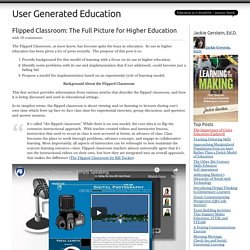
Its use in higher education has been given a lot of press recently. The purpose of this post is to: Provide background for this model of learning with a focus on its use in higher education.Identify some problems with its use and implementation that if not addressed, could become just a fading fad.Propose a model for implementation based on an experiential cycle of learning model. Background About the Flipped Classroom This first section provides information from various articles that describe the flipped classroom, and how it is being discussed and used in educational settings. In its simplest terms, the flipped classroom is about viewing and/or listening to lectures during one’s own time which frees up face-to-face class time for experiential exercises, group discussion, and question and answer sessions. It’s called “the flipped classroom.” Sal Khan, of the Khan Academy, states: Personal Experiences. A New Type of Ed School. I was observing a class called Designing Assessments at the new Relay Graduate School of Education when a student asked if it was OK to rework questions from a teachers’ guide to fit the English lesson she was teaching in a Brooklyn middle school that week.
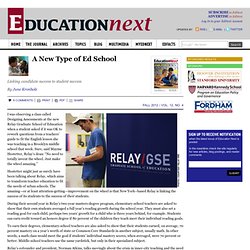
Sure, said Mayme Hostetter, Relay’s dean: “No need to totally invent the wheel. Just make the wheel amazing.” Hostetter might just as surely have been talking about Relay, which aims to transform teacher education to fit the needs of urban schools. The amazing—or at least attention-getting—improvement on the wheel is that New York–based Relay is linking the success of its students to the success of their students. What’s the “problem” with MOOCs?
I’ve joined another MOOC. Thats nice . . . What’s a MOOC? « Mark McGuire's Blog. A MOOC is a Massive Open Online Course.
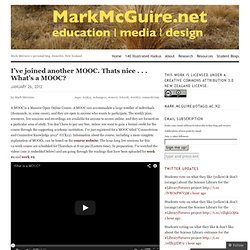
A MOOC can accommodate a large number of individuals (thousands, in some cases), and they are open to anyone who wants to participate. The weekly plan, resources, live sessions and recordings are available for anyone to access online, and they are focused on a particular area of study. Plan Your Free Online Education at Lifehacker U. > Summer Semester 2012. Your education doesn't have to stop once you get out of school—being free of the classroom just means you have more control over what you learn and when you learn it.
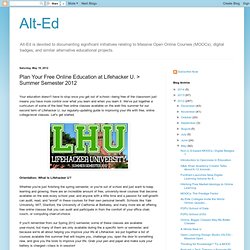
We've put together a curriculum of some of the best free online classes available on the web this summer for our second term of Lifehacker U, our regularly-updating guide to improving your life with free, online college-level classes. Let's get started. Orientation: What Is Lifehacker U? Whether you're just finishing the spring semester, or you're out of school and just want to keep learning and growing, there are an incredible amount of free, university-level courses that become available on the web every school year, and anyone with a little time and a passion for self-growth can audit, read, and "enroll" in these courses for their own personal benefit. [more] Source and Fulltext Available At. Brain Scans Could Replace The SAT By 2032. MGH-UCLA Human Connectome Project Imagine it's the year 2032. You are a high school student. You are at a center where a visual scanner confirms your identity so you can enter a room where you are about to receive a brain scan.
A robot attendant with a soothing voice recommends that you should relax and that you are welcome to take a nap. As you lie down in the scanner and earphones playing your favorite music block out ambient noise, you find yourself drifting off to sleep. You wake up. Well, as you were sleeping, you just took the neuro version of the SAT. This fictional scenario is certainly not a reality today, but perhaps something like it may be a reality in the future.
Disrupting Ourselves: The Problem of Learning in Higher Education (EDUCAUSE Review. Randy Bass (bassr@georgetown.edu) is Associate Provost and Executive Director of the Center for New Designs in Learning and Scholarship at Georgetown University.
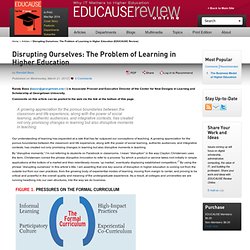
Comments on this article can be posted to the web via the link at the bottom of this page. A growing appreciation for the porous boundaries between the classroom and life experience, along with the power of social learning, authentic audiences, and integrative contexts, has created not only promising changes in learning but also disruptive moments in teaching.
Ding, Dong, the Core Is Dead. When Harvard introduced its new Core Curriculum, then-University President Derek P.
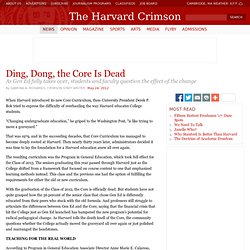
Bok tried to express the difficulty of overhauling the way Harvard educates College students. “Changing undergraduate education,” he griped to the Washington Post, “is like trying to move a graveyard.” That was 1979, and in the succeeding decades, that Core Curriculum too managed to become deeply rooted at Harvard. Then nearly thirty years later, administrators decided it was time to lay the foundation for a Harvard education anew all over again. 4 Professors Discuss Teaching Free Online Courses for Thousands of Students - Technology.
Competency Education in Higher Education: Taking the First Steps. Introducing a Game-Based Curriculum in Higher Ed - Emerging Education Technology.